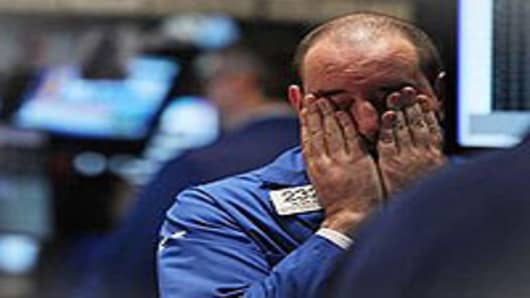With memories of last May's "Flash Crash" still fresh in investors' minds, now comes warning of a market meltdown that could extend beyond stocks—a possible "Splash Crash" that also would affect currencies, commodities and bonds.
The interconnectedness of high-speed trading platformsis making such an event increasingly possible, says John Bates, chief technology officer at Progress Software in Bedford, Mass.
Geopolitical disturbances such as those in Egypt, Tunisia and elsewhere in the Middle Eastare just the kind of things that could trigger the "Splash Crash," sapping liquidity from trading systems and causing havoc among various markets.
"The dominos are no longer limited to one asset class," Bates warns in an essay posted on the Tabb Forum, an invitation-only online repository for market research. "Algorithms are becoming increasingly sophisticated, encompassing all of the elements that may impact a trade in a certain instrument."
In the May 6 Flash Crash, the Dow dropped nearly 1,000 pointsbefore quickly recovering during one manic swoon in the markets. Studies of the event have pinned the blame on various factors, largely centering on an aggressive sell order that in turn led to a series of other problems.
The plunge happened as global markets grew more concerned over the European debt crisis. The market temporary lost liquidity, causing some large company stocks to trade momentarily at a penny, but the damage was largely limited to the equity markets.
Bates believes should a similar event happen in the future, be it caused by further disturbances in the Middle East or something else that releases market jitters and a shock to the algorithmic programs that drive high-frequency trading, the effects will be more widespread.
"We saw with the flash crash how instability in European economies caused nervousness in the market and then an algorithm did something unexpected—causing a cascading effect across futures and equities markets," he writes. "As the cross-dependencies grow and algorithms become more intertwined, so the risks for a 'splash crash' grow."
One trader asked to comment on the Bates scenario, speaking on condition of anonymity, called it "interesting" but also considered it "fear mongering" and "speculation."
But others on trading floors said the fear of a splash crash-type event looms in the market.
"We're convinced it's going to happen," says Kevin Ferry, president of Cronus Futures Management in Chicago. "We're on constant Amber Alert for signs of it unfolding, because by definition it won't come from where everybody's looking. It has to come from where they're not looking. It's our feeling that it starts in the currency market and morphs into the debt market."
The Bates splash-crash hypothetical scenario is similar to that line of thinking.
Traders involved with a multinational energy company—Bates cites BP as an example—would be impacted if China's economy starts to weaken and oil demand falls. Because oil is priced in US dollars, that would trigger a rise in the greenback while oil derivatives betting on a rise in price would get hit. That in turn would impact share prices of other large oil companies such as ExxonMobil and Chevron .
While algorithms are programmed to handle such an occurrence, the roiling of bond marketswould tick over into banks and hedge funds. Because these other markets are increasingly controlled by the same type of programs accounting for more than half the stock market trading, the effects could be profound, according to the Bates scenario.
"If enough instability and unexpected conditions occur and then one of these algorithms does something strange or unexpected, the cascading impact would be enormous across all asset classes," he writes. "Trading systems could clog up, limited bandwidth could choke orders, exchanges could freeze up—splashing across all of the affected asset classes. Pandemonium."
To be sure, it's an extreme case, one that likely would take a perfect storm of events to trigger.
But Ferry says these are the kinds of dangers ignored too often in the markets, referring specifically to the type of "Black Swan" events discussed in the book of the same name by author Nassim Taleb. The collapse of the financial system is considered one such event.
"It's a spider web of faux liquidity. Things are more complex, not less complex," Ferry says of the high-frequency trading environment. "That liquidity domino effect is what's going to cause this."
Indeed, it was a lack of liquidity during the flash crash that spread in seconds around the market and dropped stock indices so quickly, and a return of liquidity that helped mitigate the damage.
Since then, the Securities and Exchange Commission has established so-called "circuit breakers" which stop trading in individual stocks should they hit certain limits. The breakers have been tripped several times since the flash crash, and worries remain that similar events could happen again.
"If you see an erratic move in these markets and these market participants do back out, liquidity escapes extremely rapidly at that point and you get an event like you saw during the splash crash," says Brian LaRose, strategist at United-ICAP in New York. "I think it's entirely possible (that the splash-crash scenario could happen) and I don't think they've addressed it."
Bates prescribed three solutions to prevent the splash crash: using real-time trade analytics and risk management to back-test strategies in case of dire situations; providing more transparency to the high-frequency trading process; and standardizing rules across all exchanges. Progress markets software for, among other things, algorithmic and currency trading, as well as market monitoring.
But worries of another crash, in fact, crept into the market Friday when the major averages sold off aggressively as the Egypt tumult escalated, says Ryan Detrick, senior analyst at Schaeffer's Investment Research in Cincinnati.
"You got that same feeling," Detrick says. "There was definitely talk that things could spiral out of control. Fortunately, that didn't happen."



